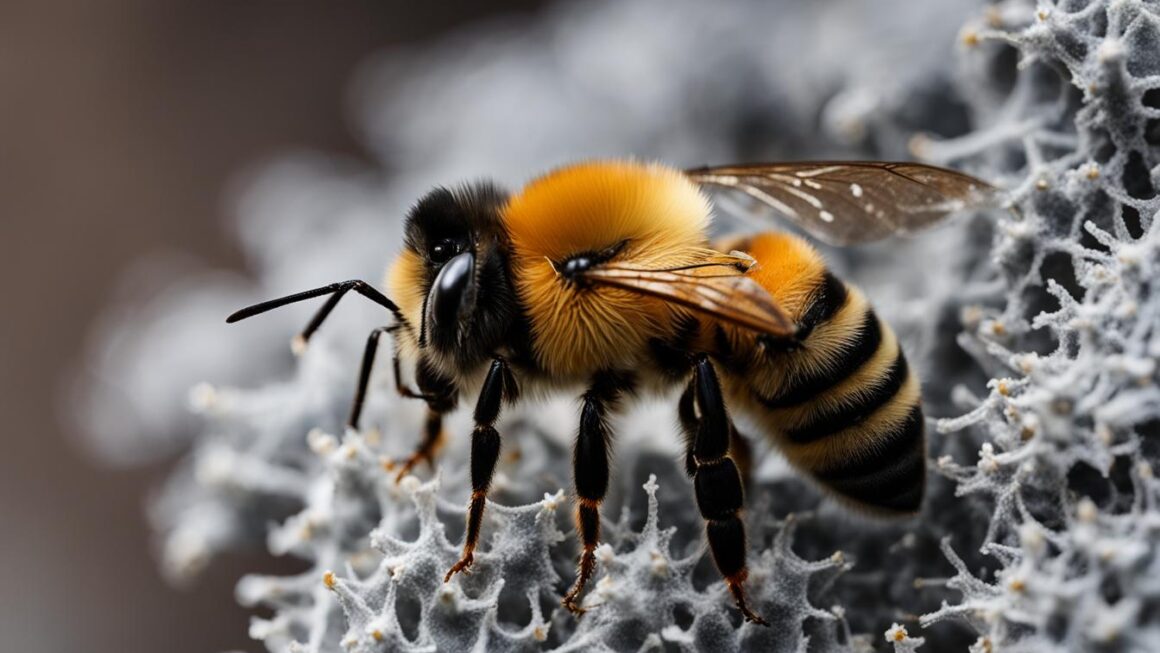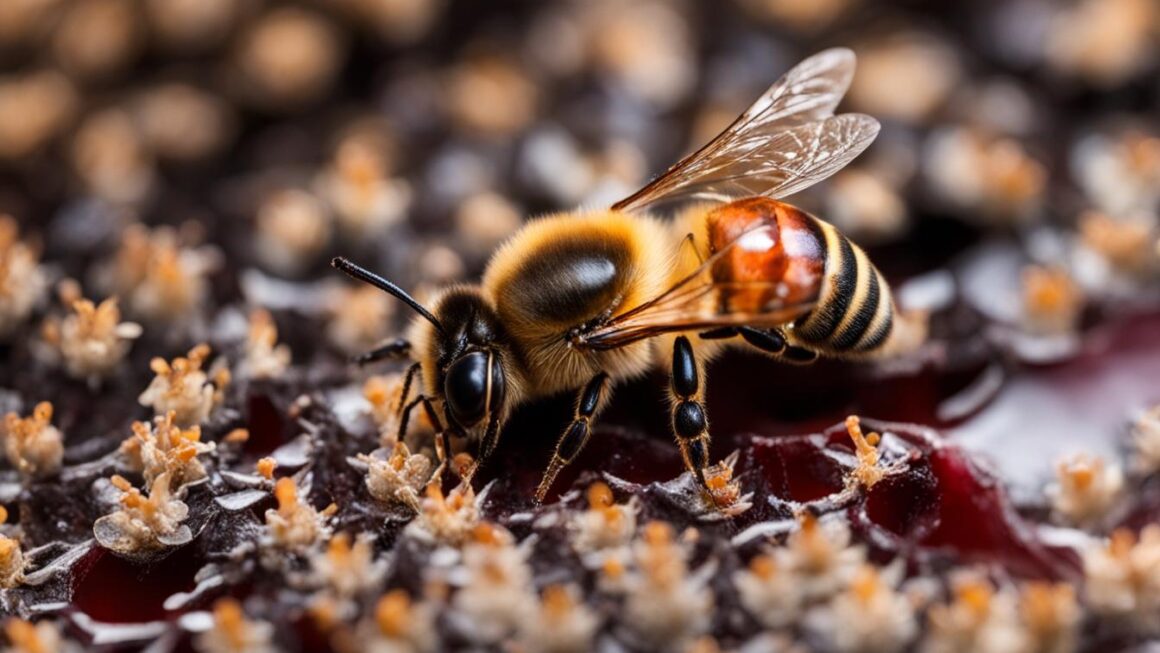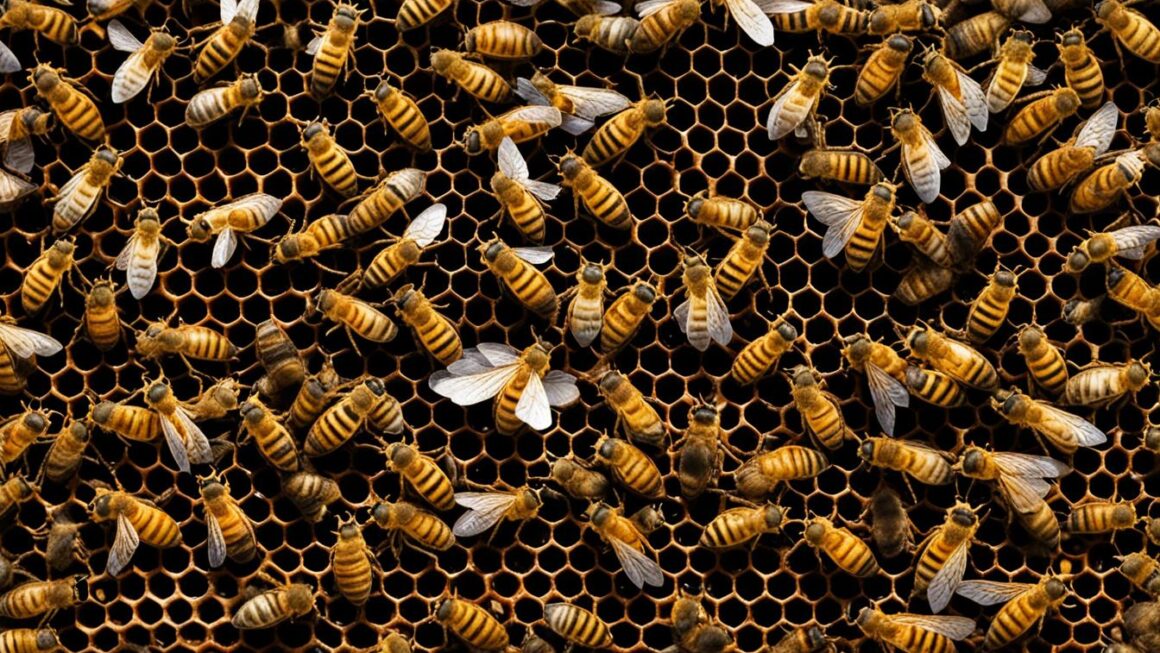Beeswax has become a popular ingredient in skincare products, touted for its moisturizing and skin-protecting properties. However, there are concerns about whether beeswax can clog pores and contribute to skin congestion. Let’s explore the truth behind the pore-clogging potential of beeswax and its overall impact on the skin.
Key Takeaways:
- Beeswax is considered a non-comedogenic substance, meaning it is unlikely to clog pores.
- Incorporating products containing beeswax into your skincare routine can help keep your skin clear and free from pore blockages.
- Beeswax possesses humectant properties, allowing it to absorb and retain moisture, promoting skin hydration and a supple texture.
- While there are ethical concerns associated with using beeswax, it offers numerous benefits for skin health, including anti-inflammatory and antibacterial properties.
- Proper hygiene practices and testing a small area of the skin are essential when using beeswax to minimize potential risks.
Is Beeswax Absorbed By Skin?
When it comes to skincare, the absorption of ingredients is a crucial factor to consider. So, does beeswax penetrate the skin or just sit on the surface? Let’s delve into the science behind beeswax and its interaction with our skin.
Beeswax is a natural substance derived from beehives, known for its unique properties. One of these properties is its ability to absorb and retain moisture. Beeswax acts as a humectant, drawing water into the skin and helping to lock in hydration. This, in turn, promotes skin’s suppleness and a more plump appearance.
In addition to its moisturizing benefits, beeswax also forms a protective barrier on the skin’s surface. This barrier helps to shield the skin from environmental aggressors, such as harsh weather conditions or pollutants, while reducing moisture loss. The result is a healthier, more resilient skin barrier.
Is Beeswax Absorbed By Skin?
While beeswax does have the ability to absorb moisture, it does not penetrate deeply into the skin layers. Instead, it primarily works on the outermost layer of the skin, providing a barrier and locking in moisture. This makes it an ideal ingredient for skincare products that aim to hydrate and protect the skin.
It’s important to note that the benefits of beeswax extend beyond skincare. Beeswax is also commonly used in haircare products, such as shampoos and conditioners, to provide moisture and improve hair texture. Its versatility and natural properties make it a popular choice for those seeking effective and eco-friendly ingredients.
So, if you’re looking for a natural ingredient that can moisturize and protect your skin, beeswax is definitely worth considering. Incorporating beeswax-based products into your skincare routine can help nourish, hydrate, and improve the overall health and appearance of your skin.
Why Not Use Beeswax?
While beeswax offers numerous benefits for the skin, there are some valid concerns to consider before incorporating it into your skincare routine. One ethical concern raised by organizations like PETA is the impact of using beeswax on bee populations. Beeswax plays a crucial role in the survival of bees, as it forms the structure of honeycombs that serve as their food source and dwelling place.
Understanding the significance of beeswax in the bee ecosystem highlights the ethical concerns associated with its use. Bees are essential pollinators, contributing to the growth and reproduction of plants, and their decline could have severe consequences for the environment. It is important to weigh the potential benefits of using beeswax against the ethical considerations surrounding its production and impact on bee populations.
The Importance of Non-Comedogenic Skincare
Another aspect to consider is the potential for beeswax to contribute to skin congestion. While it is generally considered non-comedogenic, meaning it is unlikely to clog pores, individual reactions may vary. Some individuals may find that beeswax-based products exacerbate skin congestion, leading to breakouts or other skin issues.
It is always recommended to perform a patch test before using any new skincare product, including those containing beeswax. This involves applying a small amount of the product to a small area of skin and monitoring for any adverse reactions. If you have particularly sensitive or acne-prone skin, it may be best to consult with a dermatologist before incorporating beeswax into your skincare routine.
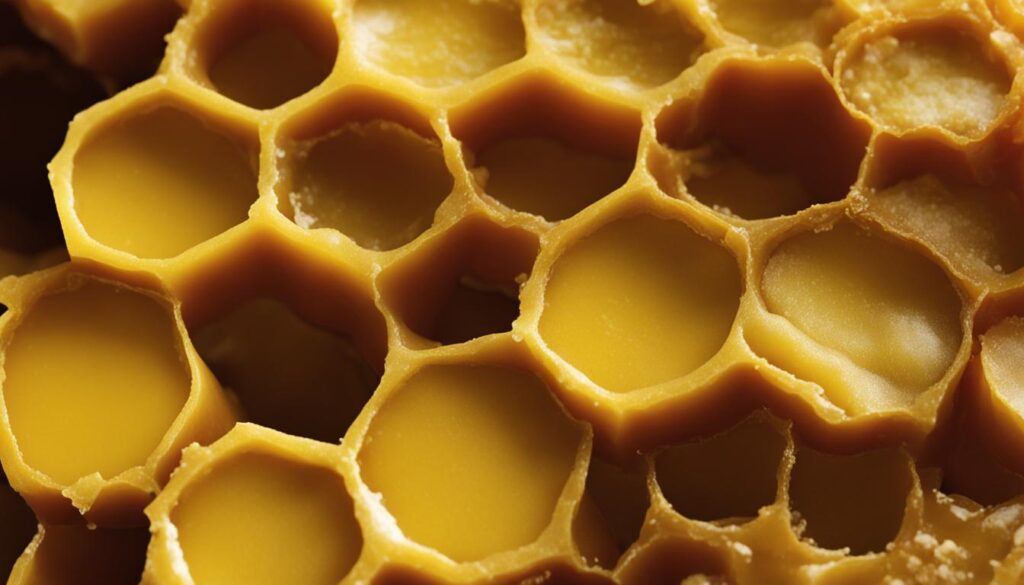
| Pros of Beeswax | Cons of Beeswax |
|---|---|
| Moisturizing properties | Potential for skin congestion |
| Anti-inflammatory benefits | Possible ethical concerns |
| Antibacterial properties | Individual reactions may vary |
While beeswax can offer hydration, inflammation reduction, and antibacterial effects, it is crucial to assess your own skin’s needs and consider any potential risks. Ultimately, the decision to use beeswax in your skincare routine is a personal one that should take into account both the benefits and concerns associated with this natural ingredient.
Benefits of Beeswax for Skin
Beeswax offers a range of benefits for the skin, making it a valuable ingredient in skincare products. Its anti-inflammatory, antibacterial, and moisturizing properties make it particularly effective for addressing acne and skin congestion.
When applied to the skin, beeswax helps reduce inflammation, soothing irritated skin and reducing redness. It also has antibacterial properties, which can assist in fighting off harmful bacteria that may contribute to acne breakouts. Additionally, beeswax acts as a natural moisturizer, helping the skin retain moisture and preventing dryness.
These properties make beeswax a suitable choice for individuals with acne-prone or congested skin. By incorporating skincare products containing beeswax into your routine, you can potentially improve the overall health and appearance of your skin.
Benefits of Beeswax for Skin:
- Reduces inflammation
- Helps fight against acne-causing bacteria
- Moisturizes and hydrates the skin
By utilizing beeswax in your skincare regimen, you can take advantage of these benefits and promote clear, healthy skin. It is important to note that while beeswax can be beneficial for many individuals, it is always advisable to consult with a dermatologist before introducing any new skincare product.
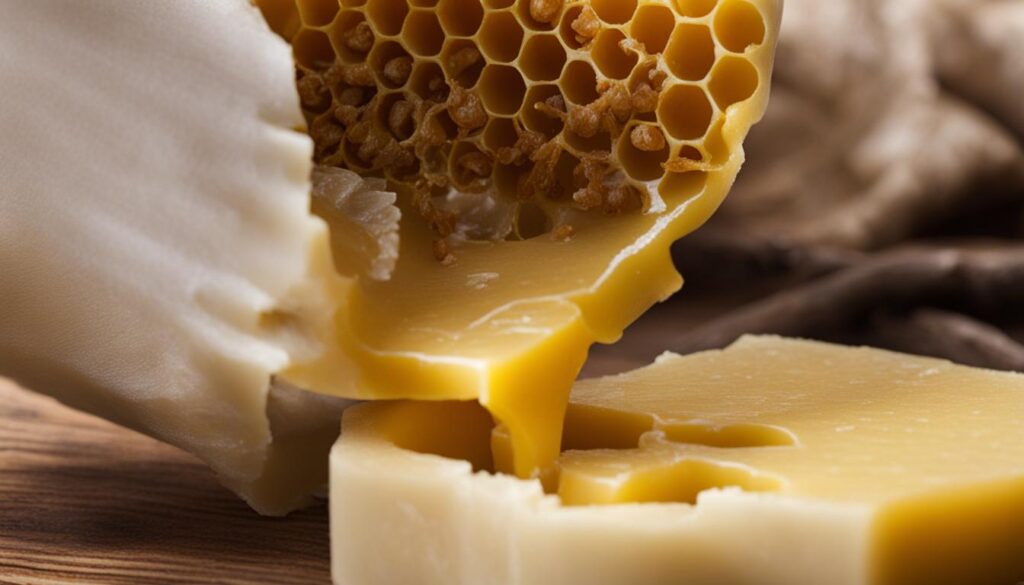
| Benefits | Beeswax | Other Ingredients |
|---|---|---|
| Reduces inflammation | Yes | Varies |
| Antibacterial properties | Yes | Varies |
| Moisturizes and hydrates the skin | Yes | Varies |
The Moisturizing Properties of Beeswax
Beeswax is known for its exceptional moisturizing properties, making it a popular ingredient in skincare products. Its ability to lock in moisture and create a protective barrier on the skin’s surface helps to prevent water loss and keep the skin hydrated. This makes beeswax particularly beneficial for individuals with dry skin.
When applied to the skin, beeswax forms a thin layer that helps to seal in moisture, providing a long-lasting hydrating effect. It acts as a natural emollient, softening the skin and improving its texture. By retaining moisture, beeswax helps to prevent dryness, flakiness, and roughness, leaving the skin smooth and supple.
Furthermore, beeswax can also help protect the skin from external factors that may contribute to dryness. It forms a barrier that shields the skin from harsh environmental conditions, like cold winds and dry air, that can strip away moisture. This protective barrier not only helps to maintain skin hydration but also acts as a defense against irritants and pollutants that can damage the skin.
| Benefits of Beeswax for Skin Hydration: |
|---|
| Locks in moisture |
| Creates a protective barrier |
| Prevents water loss |
| Softens and improves skin texture |
| Protects against environmental factors |
To incorporate the moisturizing properties of beeswax into your skincare routine, look for products that contain this natural ingredient. Beeswax can be found in various formulations, including lotions, creams, balms, and moisturizers. These products can help replenish moisture and restore hydration to dry and dehydrated skin.
Remember, when using products with beeswax, it’s important to follow the instructions provided and perform a patch test on a small area of skin before applying it to the entire face or body. This will help ensure that you do not have any adverse reactions or sensitivities to beeswax.
Checklist for Using Beeswax for Dry Skin:
- Look for skincare products that contain beeswax
- Perform a patch test before using on the entire face or body
- Follow the instructions provided by the product
- Monitor your skin for any adverse reactions
- Enjoy the moisturizing benefits of beeswax for dry skin
In conclusion, beeswax offers excellent moisturizing properties that can help hydrate and protect the skin. Its ability to lock in moisture and create a barrier against external factors makes it an ideal ingredient for individuals with dry skin. By incorporating beeswax into your skincare routine, you can enjoy the benefits of improved skin hydration and a smoother, more supple complexion.
Beeswax in Skincare Formulations
Beeswax is a versatile ingredient widely used in skincare formulations, including lotions, moisturizers, lip balms, body butters, and lipsticks. Its unique properties make it a popular choice for many skincare brands and enthusiasts.
One of the key benefits of incorporating beeswax into skincare products is its binding and thickening capabilities. Beeswax helps to create a smooth and creamy texture, allowing for easy application and absorption into the skin. This makes it an ideal ingredient for lotions and moisturizers, providing a luxurious feel while delivering essential hydration.
In addition to its texture-enhancing properties, beeswax also has skin-conditioning benefits. It forms a protective barrier on the skin’s surface, helping to lock in moisture and prevent moisture loss. This is particularly beneficial for individuals with dry or dehydrated skin, as beeswax helps to restore and maintain optimal hydration levels.
Furthermore, beeswax has been found to have emollient properties, making it an excellent choice for moisturizing lip balms and lipsticks. It helps to keep the lips hydrated and prevent chapping, while also providing a natural shine and smoothness to the lips.
Overall, the inclusion of beeswax in skincare formulations offers multiple advantages, from its texturizing and moisturizing properties to its ability to provide a protective barrier. When choosing skincare products, look for those that contain beeswax to experience its nourishing benefits for your skin.
The Benefits of Beeswax in Skincare Formulations:
- Creates a smooth and creamy texture
- Locks in moisture and prevents moisture loss
- Restores and maintains optimal hydration levels
- Provides a protective barrier on the skin’s surface
- Moisturizes and prevents chapping for lips
Table: Skincare Products Containing Beeswax
| Product | Description |
|---|---|
| Lotion | A nourishing and hydrating body lotion that leaves the skin feeling soft and smooth. |
| Moisturizer | A facial moisturizer enriched with beeswax to provide long-lasting hydration and protection against environmental stressors. |
| Lip Balm | A moisturizing lip balm infused with beeswax to soothe dry, chapped lips and keep them hydrated throughout the day. |
| Body Butter | A rich and indulgent body butter formulated with beeswax to deeply nourish and moisturize the skin, leaving it silky-smooth. |
| Lipstick | A lipstick infused with beeswax for a creamy and hydrating formula that provides intense color and long-lasting wear. |
Potential Risks and Concerns of Using Beeswax on the Skin
While beeswax offers numerous benefits for the skin, it is essential to be aware of the potential risks and concerns associated with its use. Using beeswax on the skin can potentially cause skin irritation, burns, infections, and clogged pores. It is important to exercise caution and follow proper guidelines to minimize these risks and ensure a safe experience.
Before using beeswax, it is crucial to test a small area of the skin to check for any allergic reactions or sensitivities. Apply a small amount of the product to a small patch of skin and monitor the area for at least 24 hours. If no adverse reactions occur, it is generally safe to continue using beeswax.
Proper hygiene practices should also be followed when using beeswax on the skin. Ensure that your skin is clean and dry before applying the product to prevent the risk of infection. It is also recommended to follow the instructions provided by the product manufacturer to ensure proper application and usage.
Important Considerations:
- Always perform a patch test before using beeswax on the skin.
- Follow proper hygiene practices to minimize the risk of infection.
- Read and follow the instructions provided by the product manufacturer.
- If you experience any adverse reactions or discomfort, discontinue use immediately and consult a healthcare professional.
By exercising caution and following these guidelines, you can enjoy the benefits of beeswax while minimizing the potential risks.
Table: Potential Risks and Concerns of Using Beeswax on the Skin
| Risk | Description |
|---|---|
| Skin irritation | Beeswax can cause redness, itching, or rashes in individuals with sensitive skin or allergies. |
| Burns | If beeswax is heated to a high temperature, it can cause burns if it comes into direct contact with the skin. |
| Infections | Improper hygiene practices or contaminated beeswax products can lead to skin infections. |
| Clogged pores | Beeswax has the potential to clog pores if not properly removed from the skin. |
It is important to note that the risks and concerns associated with using beeswax on the skin are relatively rare when proper precautions and guidelines are followed. However, individuals with pre-existing skin conditions or allergies should consult with a dermatologist before incorporating beeswax into their skincare routine.
Beeswax in Spa Treatments
Beeswax, with its array of beneficial properties, is a popular ingredient in various spa treatments. Its anti-inflammatory, moisturizing, and skin-protecting qualities make it a valuable component in facials, massages, and pedicures. Spa professionals harness the power of beeswax to soothe inflammation, lock in moisture, and create a protective barrier for the skin. Whether you have sensitive skin or skin conditions like psoriasis and eczema, beeswax can provide the nourishing care your skin needs.
During facials, beeswax is often used in the form of facial masks or balms. These treatments help calm irritated skin, reduce redness, and promote a healthy complexion. The moisturizing nature of beeswax allows it to deeply hydrate the skin, leaving it soft, smooth, and rejuvenated. Additionally, the protective barrier created by beeswax helps shield the skin from environmental stressors, such as pollution and harsh weather conditions.
In massages, beeswax is used in creams or oils to enhance the therapeutic experience. The moisturizing properties of beeswax can help to relax and nourish the skin during the massage, leaving it feeling hydrated and refreshed. The anti-inflammatory properties of beeswax also contribute to the soothing effects of the massage, providing relief to sore muscles and promoting overall relaxation.
For pedicures, beeswax-based products are often utilized to soften and heal dry, cracked skin on the feet. The moisturizing benefits of beeswax help to restore hydration and smoothness to the skin, while its antibacterial properties aid in preventing infection. Beeswax can also provide a protective barrier against friction and pressure, particularly in areas prone to calluses and blisters.
Table: Benefits of Beeswax in Spa Treatments
| Benefits | Explanation |
|---|---|
| Anti-inflammatory | Reduces inflammation and redness in the skin |
| Moisturizing | Hydrates and nourishes the skin, leaving it soft and smooth |
| Skin-protecting | Creates a barrier against environmental stressors |
| Relaxing | Contributes to a soothing and calming spa experience |
| Healing | Helps soften and heal dry, cracked skin |
With its numerous benefits and versatility, beeswax has become a go-to ingredient in the world of spa treatments. Whether you’re seeking relaxation, hydration, or skin healing, incorporating beeswax into your spa experience can provide the nourishing care your skin deserves.
Conclusion
Beeswax is a versatile ingredient that offers numerous benefits for the skin. It is non-comedogenic, meaning it is unlikely to clog pores, making it suitable for all skin types. Incorporating products containing beeswax into your skincare routine can help keep your skin clear and free from pore blockages.
In addition to its non-comedogenic properties, beeswax also possesses humectant properties, allowing it to absorb and retain moisture. This makes it a great ingredient for promoting skin hydration and a supple texture. Whether used in lotions, moisturizers, or lip balms, beeswax provides moisturizing benefits and improves the health and appearance of the skin and hair.
While there are potential risks and ethical concerns associated with using beeswax, such as skin irritation and ethical considerations surrounding bee welfare, the benefits it offers cannot be ignored. Beeswax has anti-inflammatory, antibacterial, and moisturizing properties, making it beneficial for acne-prone skin, skin congestion, and dry skin. It can soothe irritated skin, fight off harmful bacteria, and help the skin retain moisture.
Whether incorporated into skincare formulations or utilized in spa treatments, beeswax can be a valuable addition to your skincare routine. It provides numerous benefits for skin health and overall well-being. So, consider harnessing the power of beeswax and experience the positive effects it can offer to your beauty and skincare regimen.
FAQ
Can beeswax clog pores?
No, beeswax is considered a non-comedogenic substance, meaning it is unlikely to clog pores.
Is beeswax absorbed by the skin?
Yes, beeswax possesses humectant properties, allowing it to absorb and retain moisture on the skin.
Why should I not use beeswax?
Some ethical concerns are raised by organizations like PETA due to the impact of beeswax harvesting on bees. Beeswax forms the structure of honeycombs, which serve as the bees’ food source and dwelling place.
What are the benefits of beeswax for the skin?
Beeswax has anti-inflammatory, antibacterial, and moisturizing properties. It can soothe irritated skin, fight off harmful bacteria, and help retain moisture, making it beneficial for acne-prone skin and skin congestion.
Does beeswax moisturize the skin?
Yes, beeswax has moisturizing properties and can help absorb and retain water on the skin. It forms a protective barrier, reducing dryness and improving skin hydration.
Where can I find beeswax in skincare products?
Beeswax is commonly found in lotions, face moisturizers, lip balms, body butters, and lipsticks. Its binding, thickening, and skin-conditioning properties make it a popular ingredient in skincare formulations.
Are there any risks associated with using beeswax on the skin?
Using beeswax on the skin can potentially cause skin irritation, burns, infections, and clogged pores. It is important to test a small area of the skin before using beeswax and to follow instructions carefully.
How is beeswax used in spa treatments?
Spas utilize beeswax in various treatments like facials, massages, and pedicures. Beeswax soothes inflammation, locks in moisture, and provides a protective barrier to the skin, making it beneficial for individuals with sensitive skin or skin conditions like psoriasis and eczema.
What are the overall benefits of using beeswax?
Beeswax offers numerous benefits for the skin, including being non-comedogenic, moisturizing, and having anti-inflammatory and antibacterial properties. It can improve skin health and overall well-being.

